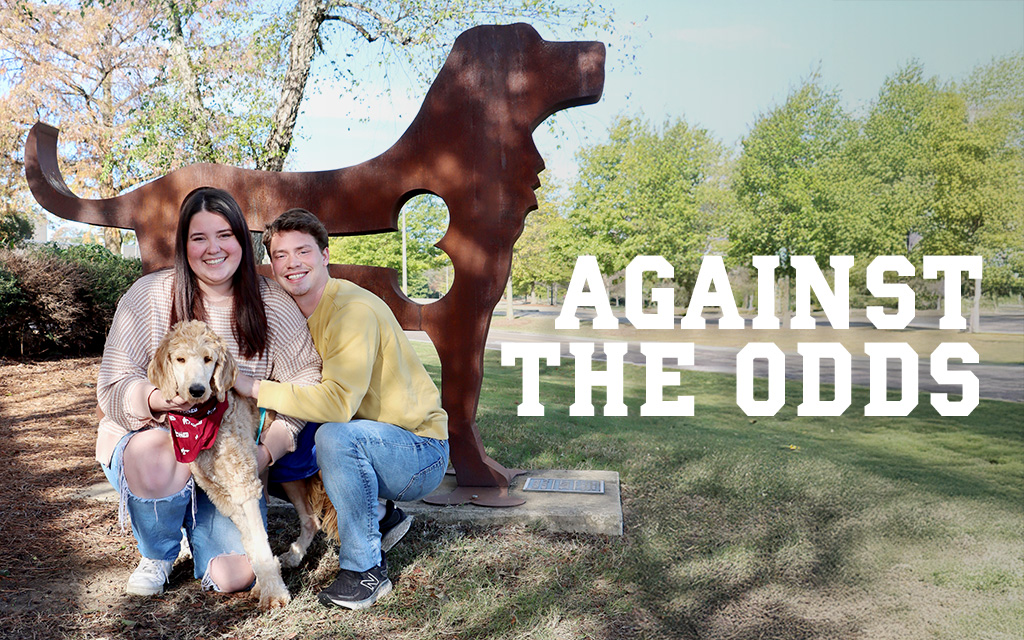
Mississippi State’s Animal Health Center gives pet owners hope
On a stormy night in Arkansas, a car hit a runaway Goldendoodle, leaving her stranded on the road unable to move.
Dylan McCay and Emily Roberts, a young, engaged couple, saw a social media post from a delivery driver about the injured dog in need of help. McCay drove in the rain and found the 10-month-old puppy now named Maple lying in mud. With an array of blankets and towels ready, he carefully loaded her in the car.
“Her temperament was wonderful. I had my hazard lights on, got out and she was trying to scoot over toward me,” McCay said. “She put her head on my lap as I’m trying to call emergency hospitals. The whole time, she just wanted to be loved on.”
Maple’s hind legs were broken, both femurs were exposed to the elements and caked in mud. McCay and Roberts rushed Maple to Greenbrier Animal Hospital where MSU graduate Dr. Eric Schrand initially handled her case. He recognized the severity of her injuries and the likelihood of amputation but suggested finding a nearby surgical specialist to give Maple the best path to recovery.
Roberts and McCay tried admitting Maple to animal hospitals in Little Rock, Arkansas, and Memphis, Tennessee—both within 100 miles of their home in Conway—but because of those clinics’ caseloads and the immediacy needed, both denied Maple as a patient. Schrand told the couple Maple’s best chance at recovery was more than 300 miles away at Mississippi State.
Dr. Michael Jaffe, MSU’s chief of small animal surgery, said the university’s Animal Health Clinic sees every patient that comes through the doors—often serving as pet owners’ last best chance for hope. MSU veterinarians provide a fresh perspective for these lost-cause cases and often bring about miraculous recoveries.
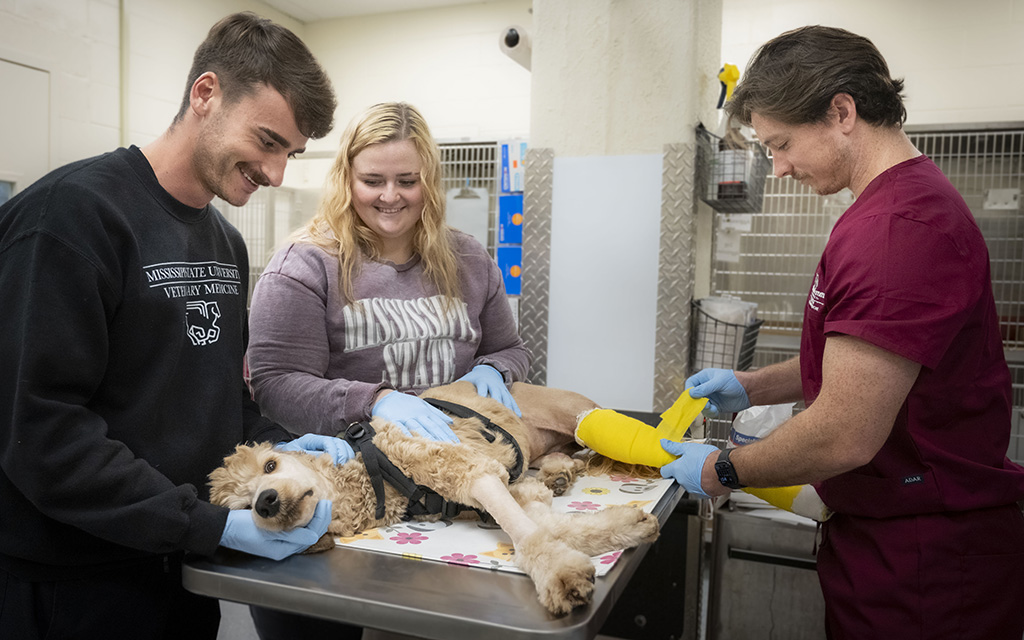
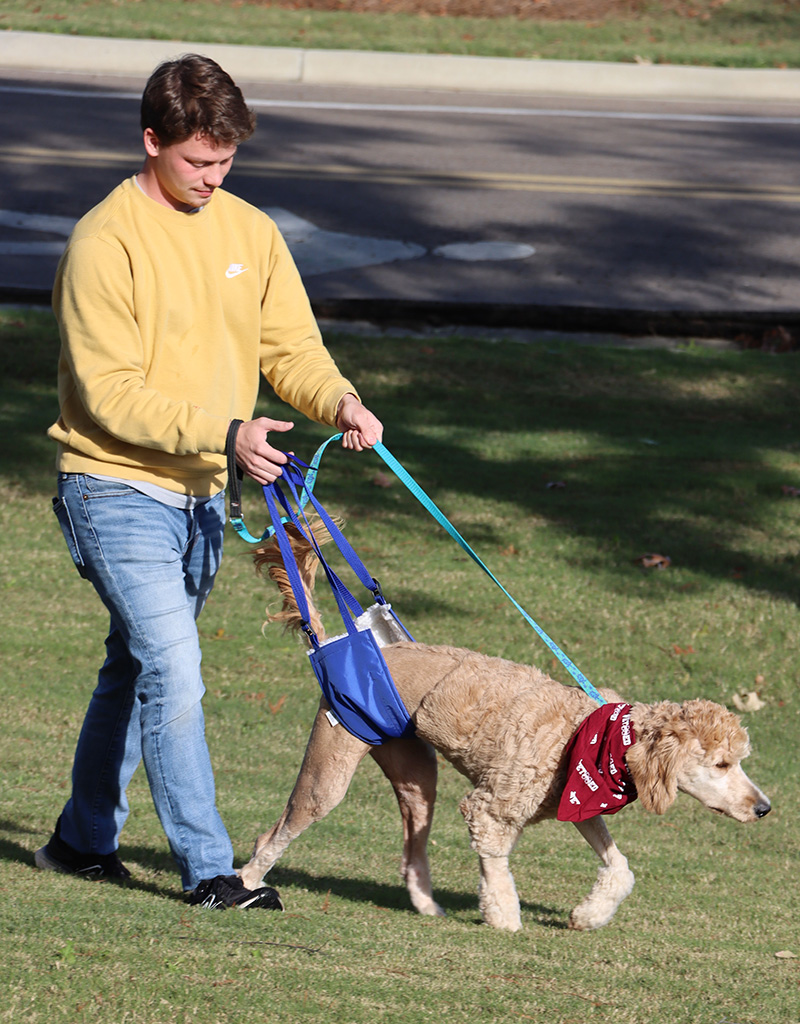
Top: Veterinary students and clinicians at Mississippi State wrap Maple’s bandages and monitor her progress during an exam. Bottom: With support from her rescuers, Maple takes early steps on all four legs after surgery—a powerful milestone made possible by the compassionate expertise at Mississippi State.
In recent years, pet owners have traveled to Starkville from Tennessee, Alabama, Louisiana, Kentucky, Georgia and Arkansas looking for hope, sometimes bypassing other vet schools on their journeys.
“Mississippi does not have any other true specialized animal hospitals. There’s nobody else. There’s just us,” Jaffe said. “But it’s not just Mississippi. It’s crazy how far people come for the services our experts provide. People will find a way to bring their pets here for care.”
With a referral from Schrand, the Arkansas couple drove with Maple to Starkville. Using the money previously earmarked for their wedding, they dropped Maple off hoping for the best possible outcome: her survival and comfort. Jaffe and second-year surgical resident Dr. Weston Beamon spent five hours piecing Maple’s legs together with five screws, two pins and one bond plate in each leg.
“They were expecting her to go home with an amputated leg, but she went home on four legs,” Jaffe said. “That’s an amazing thing for us. That’s why we do what we do.”
Now, Maple has nearly recovered from her October accident thanks in large part to MSU’s CVM. But the Mississippi State experts aren’t just in Starkville. The couple’s primary veterinarian is an MSU graduate, as is the doctor who did her hydrotherapy sessions. Forever grateful for the care they received, the couple has bought into the Mississippi State culture and are now proud members of the extensive Bulldog family.
“There’s been a ton of MSU family involved in our girl’s recovery,” Roberts said. “We’re definitely Mississippi State fans now. Maple has the cutest MSU jersey, and she wore it on our return journey to Starkville for her follow-up. For Maple to now comfortably walk on her legs is nothing short of a miracle considering the degree and location of her fractures.”
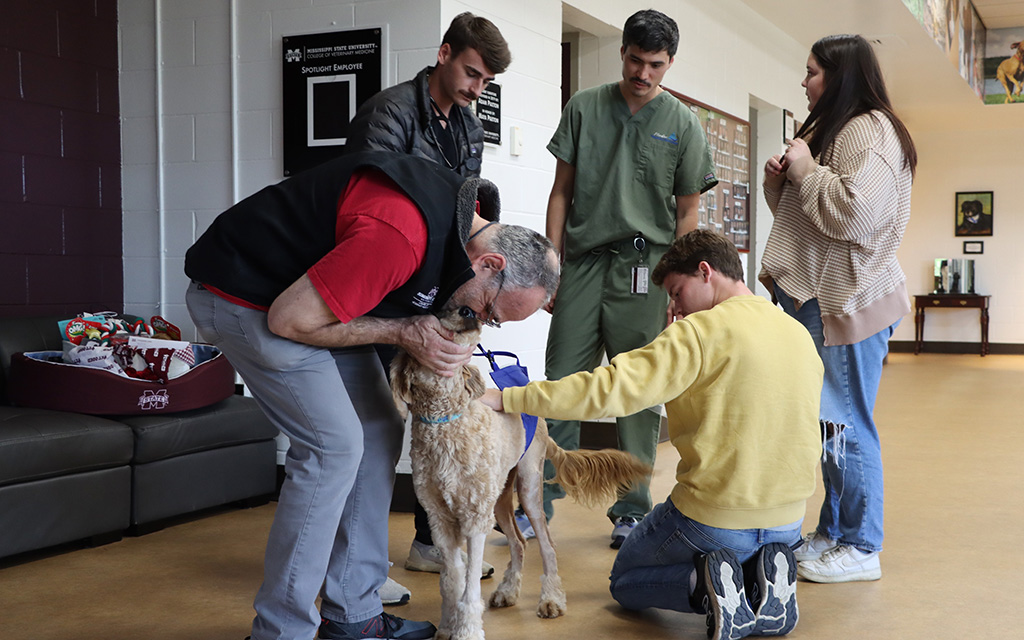
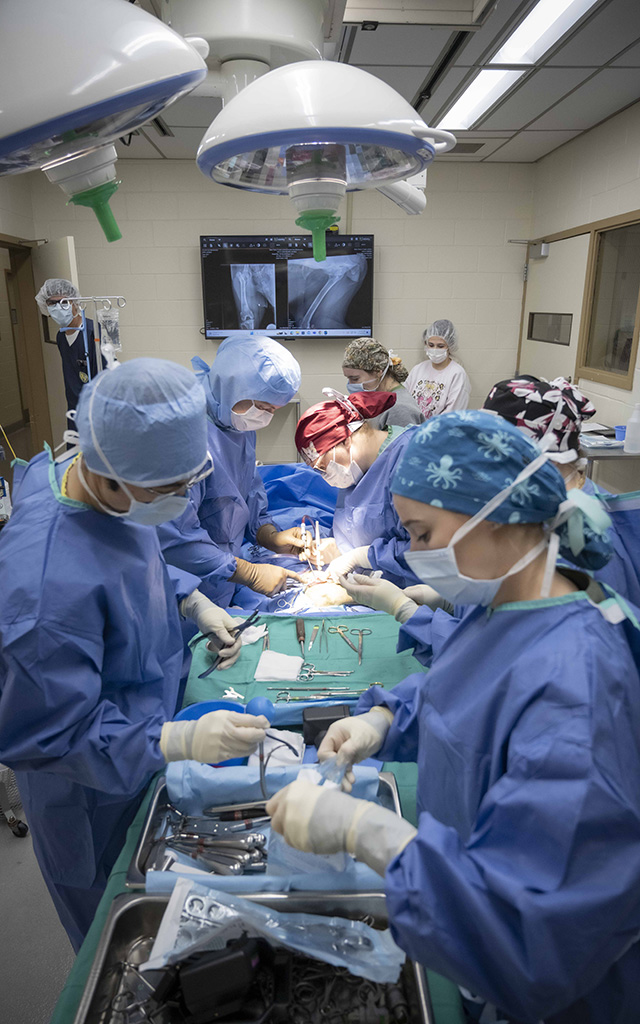
Top: The MSU Animal Health Center team says farewell to Maple as she heads home with Dylan McCay and Emily Roberts. Bottom: CVM’s Animal Health Center performs one of its many complex procedures as part of the more than 100 major surgeries completed each month. With specialists across disciplines, the center offers advanced care for pets from across the Southeast.
Mississippi State is the answer
For pet owners across the Southeast, the Mississippi State Animal Health Center serves as a beacon of hope. There’s a number of reasons they travel such a distance to Starkville, Jaffe said. A large portion of the Animal Health Center’s success is rooted in the staff and faculty’s expertise, but another crucial aspect is its open-door policy.
“We are a multi-specialty hospital, but there are other vet schools that have those specialties as well,” he said. “One of the things that is outstanding about Mississippi State, is we don’t close our doors to anybody or anything. During COVID, some vet schools closed their doors. We saw cases straight through the pandemic. We never shut down.”
Accepting every patient can make the hospital busy, and the clinic usually is too. Not including spays or neuters, the Animal Health Center performs more than 100 major surgeries a month, including ACL repairs, neurological surgery, fracture repair and more.
In need of specialized care and expert knowledge, pet owners from every background, ranging from a Fortune 500 company CEO to the young, engaged couple who sourced a GoFundMe to save Maple the Goldendoodle, seek help from MSU’s CVM.
“You don’t know who you’re treating, and it doesn’t matter. We offer the same level of care to everyone. That sends a strong message to our students,” Jaffe said. “We are a service-oriented profession, and I think students gain a greater sense of empathy for patients and sympathy for owners.”
Mississippi State boasts a team of specialists across a wide range of fields, including surgery, neurology, ophthalmology, dermatology, radiology, anesthesiology, community practice and critical care. This multidisciplinary team guarantees collaborative care for every patient.
“We work very cohesively and that’s what attracted me to come here,” Jaffe said. “There is such a good working environment between the services. It’s not like that everywhere, but it is here. The students really see how well these services work together.”
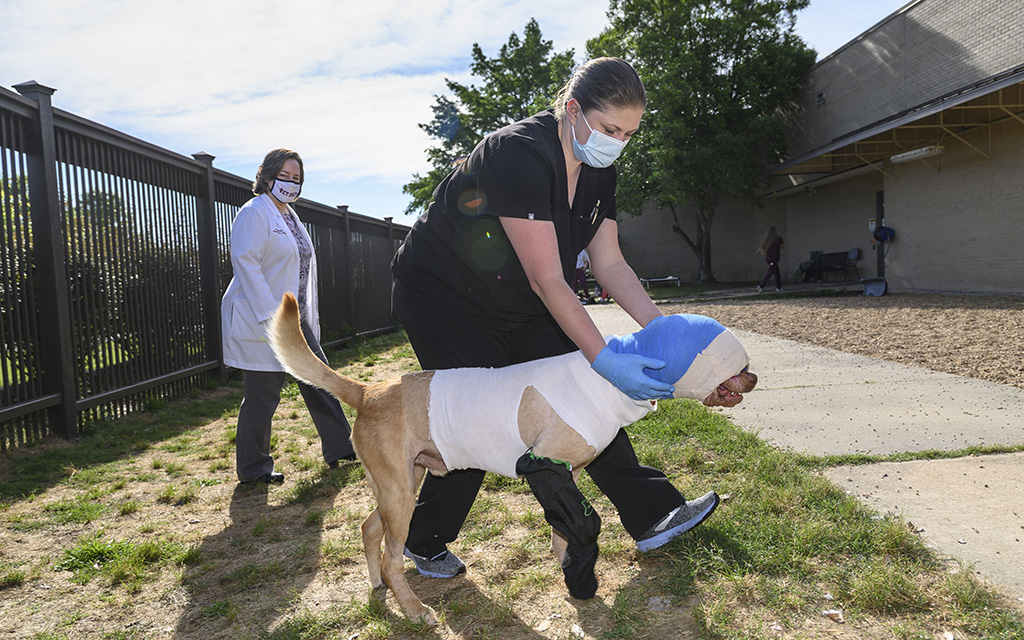
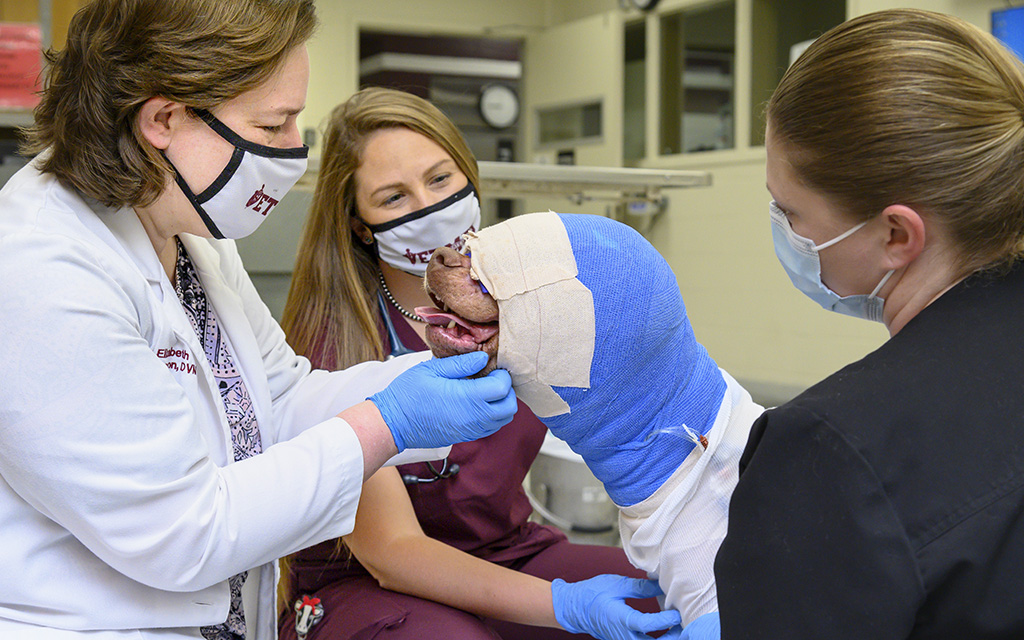
Wrapped in bandages after receiving extensive facial burns, Buddy came to Mississippi State in need of urgent, specialized care. Despite his injuries, the resilient Labrador greeted staff with tail wags and kisses to make the start of his monthslong journey to recovery. The veterinary team was led by Dr. Betsy Swanson (top left), with significant involvement from vet student Dr. Melody Whitney, who is now an assistant clinical professor.
Saving Buddy
One well-known example is Buddy, a young Labrador retriever found in Tate County with an extension cord wrapped around his neck and extensive facial burns after being set on fire by a 12-year-old. He needed Mississippi State and its staff to not only survive but live the best life possible.
Tunica Humane Society originally handled Buddy’s case, but soon contacted Dr. Betsy Swanson, an MSU associate professor of small animal surgery. She started brainstorming Buddy’s optimal path to recovery using fish skin grafts. She was getting a Brazilian research paper on using tilapia skin for burns translated to English, when she recalled a colleague’s work with Kerecis, a medical device company that produces skin grafts for animals and humans from ethically sourced cod.
By the time Buddy arrived in Starkville, Swanson had spearheaded a gift from Kerecis VET, which gave nearly $25,000 of North Atlantic cod skin grafts to treat Buddy’s burns.
“When he came to us, his whole head was wrapped, but he still came out of that car with his tail wagging and giving everybody kisses,” Swanson said. “All he had to do was brush that bandage against something and he would whine. All you could think was that poor, poor dog. How is he so strong that he’s still loving everybody?”
The extensive, state-of-the-art procedures and surgeries performed at MSU, guaranteed Buddy’s best possible outcome during his eight-month stay in Starkville. For Buddy’s case, Swanson said he needed 24/7 care with specialists in surgery, critical care, anesthesia, ophthalmology, pharmacy and community veterinary services to survive and recover. In short, he needed Mississippi State.
“The resources Mississippi State provides, especially in Mississippi where there are not a lot of specialty veterinary practices, is needed,” she said. “To have a place like this that can offer this level of care and these specialists is invaluable.”
Buddy garnered national support and an online following from those hoping to adopt him after his recovery. But as an unofficial mascot for the vet school, Buddy found a home in Starkville with Swanson who fostered him before officially making him a part of her family.
“It wouldn’t seem right for Buddy to be anywhere else,” Swanson said.
Still ever-present on campus, Buddy wags his tail and is happy to greet everyone wherever he is, from vet school open houses to the Starkville Dachshund Dash.
“I already loved him as my patient and just seeing him in my home—he was exactly the kind of dog that I love,” Swanson said. “He’s super smart and wants to learn, very interactive. I was head over heels in love with him as a companion, not just as my patient.”

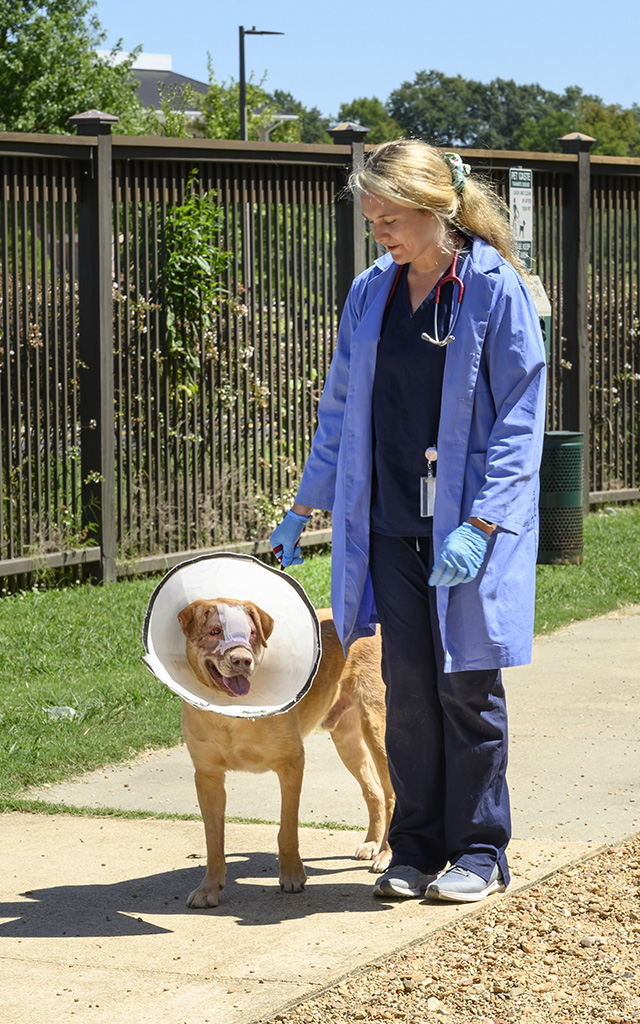
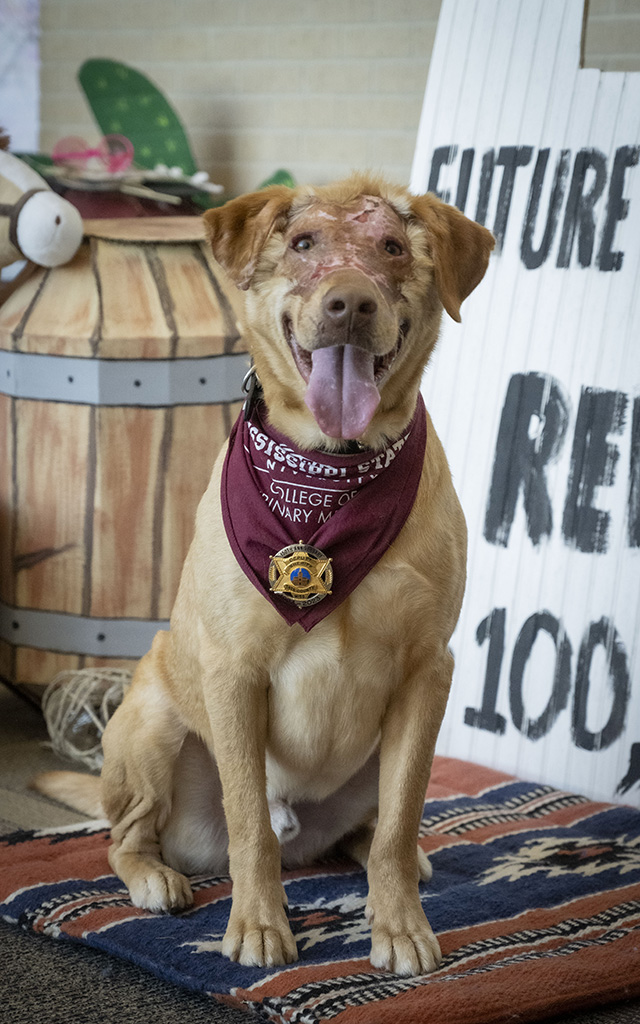
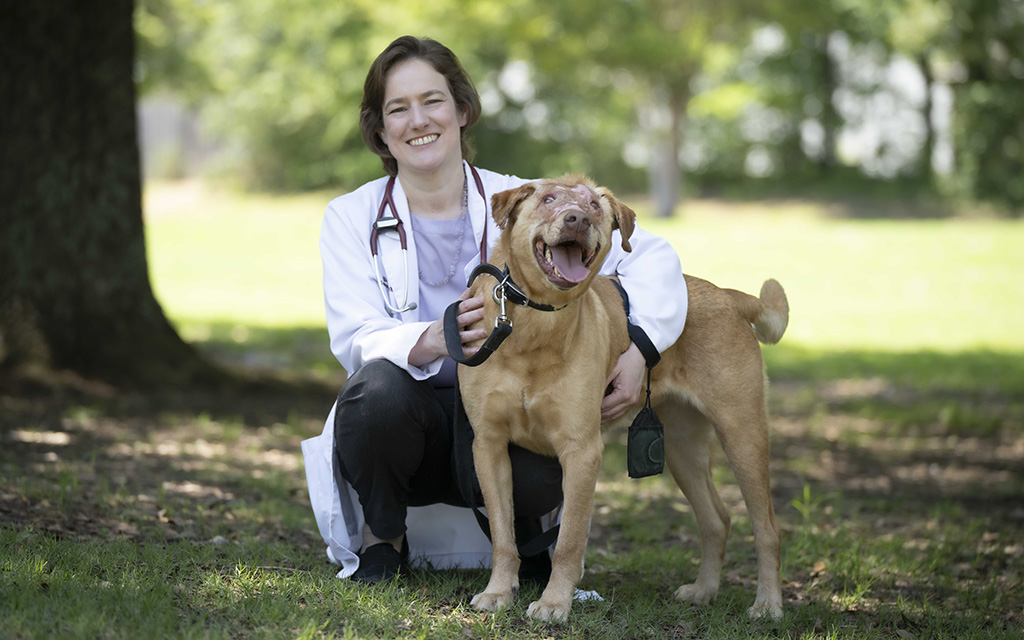
Top: Buddy’s case brought together a team of specialists working around the clock to give him a second chance at life. Middle: Buddy’s transformation is nothing short of extraordinary. Thanks to innovative cod skin grafts and months of expert care, the once-severely burned pup made a stunning recovery. Bottom: From patient to family, Buddy found his forever home with Dr. Betsy Swanson—the MSU veterinarian who led his care.
‘This is what we do’
Because of the university’s expertise and level of care, MSU veterinarians will always see cases like Buddy and Maple. As popular as those dogs became online, MSU sees hundreds more a year that go unnoticed.
“There’s a lot of rescue groups in the area that we work with. We see a lot of these cases here because we don’t say no to anything,” Jaffe said. “If we see someone in need of care, we help them. If there’s any chance we can help these animals, one way or another, we go for it.”
Jaffe explained that these cases, though sometimes challenging, give faculty, staff and students the experience needed for every case they treat.
“We see so many puppies with old fractures and we have to try and piece them back together,” he said. “These dogs with old injuries may not always turn out as successful as we want, but we offer them a much higher quality of life. As surgeons, we always have a vision of the perfect surgery and we don’t like anything less than perfect.”
This mentality isn’t uncommon at Mississippi State. Though Maple and Buddy’s cases are a testament to the lengths Mississippi State veterinarians will go to for every patient, their stories aren’t unique. Swanson approaches every case with that same research and passion.
That’s true across the board. That’s the standard for the Animal Health Center’s staff: exhaust all options and give each patient a fighting chance.
“That is what we do, it’s why we’re here,” Swanson said. “We can’t save them all, but we sure try. You never know when a miracle can happen, Buddy sure was one.”
By Mary Pollitz, Photos by Tom Thompson and Amelia Andersson
CVM Funds Save Animals: Support Critical to Veterinary Care

The Mississippi State College of Veterinary Medicine offers exceptional medical care for animals, but this expertise comes at a price. Fortunately, programs like the Sue and Sarge McLean Client Assistance Fund and the Small Animal Good Samaritan Fund help fill the gap.
Jimmy Kight, CVM senior director of development and team lead, explains that these funds provide essential financial support for both owned and unowned animals in need of life-saving care. Without these funds, the thousands of dollars required for such care would be out of reach for many pet owners.
“Many people have dogs and cats, and at some point, they all need to go to the vet. When you need the highest level of care, you come here,” Kight said. “Pets are like family and we all want the best medical care for our family. That’s what the College of Veterinary Medicine provides.”
The CVM funds make an impact because of the gifts from those who believe in the university’s mission. Help continue to grow CVM’s impact through generous gifts online.

